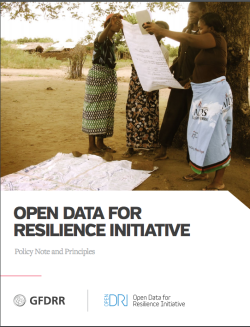The OpenDRI team is super excited about UR2016 in Venice! As always, the schedule is jam packed full of interesting and innovative sessions that we can’t wait to participate in and learn from. The themes of open data, community participation in risk assessment, and improving risk communications are all hot topics at this event. We’re excited to see this ideas continue to gain traction in the Understanding Risk Community.
At this UR, we are releasing a new short video that gives an introduction and overview of the Open Data for Resilience Initiative:
We also are launching a brand new publication, the OpenDRI Policy Note and Principles, and co-organizing a number of sessions. Read on for details!
 OpenDRI Policy Note & Principles
OpenDRI Policy Note & Principles
This publication is the result of long-term conversations within the team and our partners in organizations such as the Humanitarian OpenStreetMap Team, the US State Department, and the American Red Cross. It describes the approach taken by the OpenDRI team to design and enact impactful and sustainable projects with our partner organizations and communities. It is organized into a series of nine principles, the first 5 of which guide our thinking about how risk information should be created, managed, and used. The final 4 principles shape our relationships with other actors involved in OpenDRI work. Following a short description of each principle, we provide examples from past OpenDRI projects and suggestions for relevant resources. Download the new publication here: https://www.gfdrr.org/sites/default/files/publication/OpenDRI%20Policy%20Note.pdf
OpenDRI Focus Day Events and Technical Sessions
Tuesday
09:00 – 17:00 Learning InaSAFE through open data for resilience serious game! – GFDRR, Open Data for Resilience Initiative (OpenDRI), InaSAFE, DM Innovation, Australian Aid & Kartoza, Room: Sala A
InaSAFE is a software tool intended to help disaster managers to be better prepared for natural disasters. It is a free software and runs on all major operating systems. InaSAFE has been used in many countries around the world. The workshop will be in two sessions: the morning session will be in the format of a ‘serious game’ where we will use InaSAFE and other tools to demonstrate the contingency planning process and show the effect that planning decisions can have on outcomes in the event of a disaster. During the afternoon session we will have a series of case studies where users of InaSAFE will share the achievements and pitfalls of using InaSAFE as a tool for disaster management. The afternoon session will conclude with an open forum discussion where users and prospective users of InaSAFE can voice their ideas, concerns and experiences. The workshop is open to users and prospective users of all skill and experience levels. You should bring your own laptop. We will supply all the software and training materials you need to get started with InaSAFE. These can be freely shared with your colleagues. If you wish to find out more about the InaSAFE project, please visit http://inasafe.org.
13:00 – 15:00 Responsible data use in understanding risk – UN OCHA, GovLab, Humanitarian Data Exchange & GFDRR, Room: Sala B+C
This side event will explore the risks to using certain types of data in the humanitarian and development spheres and in understanding risk. Discussion will focus on three areas:
1) Establishing a set of overarching principles for using data responsibly;
2) Methodologies and frameworks to determine the benefits and risks for using sensitive data;
3) Practical tools and mitigation strategies for managing sensitive data.
The event will include a keynote speaker with a question and answer session which will be followed by a workshop where participants can test their data against frameworks for assessing risk. The event will conclude with a summary of common data risks and harms and useful mitigation strategies.
Thursday
16:00 – 17:30 – Breaking barriers for the common good: Open data and shared risk analysis in support of multilateral action
The quantity and quality of risk information for crisis and disaster prevention, preparedness and response is increasing. However, it is often sector-specific and not widely available to decision-makers and other stakeholders. Applying the concepts of open data can increase the quality and availability of information for managing crisis and disaster risk, and involve a broader section of the population in the challenge of building resilience. For it to be most effective, this information then needs to be translated into shared analysis that governments and their partners can use to work together to manage risks.
Open and shared risk analysis can help overcome institutional barriers between governments, development, DRR, humanitarian and other multilateral actors. This session will look at advances in open data and shared risk analysis and envisage a future where they underpin collaborative and coordinated action between government, private sector, civil society, and the international community.
Friday
14:00 – 15:30 – Bridging the divide: Digital humanitarians and the Nepal earthquake
When the Gorkha Earthquake struck in Nepal in April 2015, civil society groups from Nepal and around the world sought to provide aid to the affected and assistance to humanitarian responders working in the field. In recent years, “Digital Humanitarians,” who support disaster response by collecting, classifying, and analyzing critical information from social media and other sources have begun to play an increasingly important role during crises. Yet the extent to which formal responders in the Nepal government and international agencies and volunteer organizations like Kathmandu Living Labs, the Humanitarian OpenStreetMap Team, and the Digital Humanitarian Network collaborated during the Nepal Earthquake response was unprecedented.
This session will examine the role that crowdsourcing and community mapping played in providing information to disaster responders in Nepal, explore the factors that facilitated partnership between the formal and the informal digital responders, and examine challenges experienced by the various actors. The session will also explore opportunities and barriers to undertaking similar efforts in other countries.
